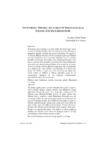Mostrar o rexistro simple do ítem
The Feminist Writing of Charlotte Perkins Gilman: Pausing for the Chronotope
| dc.contributor.author | Núñez-Puente, Carolina | |
| dc.date.accessioned | 2015-12-16T14:50:23Z | |
| dc.date.available | 2015-12-16T14:50:23Z | |
| dc.date.issued | 2006 | |
| dc.identifier.citation | Núñez-Puente, Carolina. "The Feminist Writing of Charlotte Perkins Gilman: Pausing for the Chronotope". Philologia Hispalensis 20 (2006): 111-137. Print. | es_ES |
| dc.identifier.issn | 1132-0265 | |
| dc.identifier.uri | http://hdl.handle.net/2183/15752 | |
| dc.description.abstract | [Abstract]The purpose of this paper is at least triple-fold. First of all, it hopes to show a fruitful dialogue between feminist and Bakhtinian critical approaches. Second, by means of a chronotopic reading of C. P. Gilman’s saga, Herland-Ourland (1915-6), the paper explores that Gilman had to transform certain Bakhtinian chronotopes (e.g. the chronotope of idyll, the castle chronotope), and also to invent new ones (e.g. the chronotope of rape, the motherhood chronotope), in order to develop a feminist-dialogic critique of the society of her time. Third, the paper touches upon the different points-of-view between ‘first-wave’ feminists like Gilman and the feminists of the ongoing ‘third wave.’ Finally, it is expected that readers, who perform a critical reading of Bakhtin and Gilman, learn about the dialogical features of truly intersubjective/ethical relations between people. | es_ES |
| dc.description.abstract | [Resumen] El propósito de este artículo es al menos triple. En primer lugar, espera mostrar un diálogo fructífero entre las perspectivas críticas feminista y bajtiniana. Segundo, mediante una lectura cronotópica de la saga de C. P. Gilman, Herland-Ourland (1915-6), el artículo explora que Gilman tuvo que transformar ciertos cronotopos bajtinianos (e.g. el cronotopo del idilio, el cronotopo del castillo), como también que inventar otros (e.g. el cronotopo de la violación, el cronotopo de la maternidad), para desarrollar una crítica feminista-dialógica de la sociedad de su tiempo. Tercero, el artículo trata las diferentes perspectivas entre las feministas de la ‘primera ola,’ como Gilman, y las feministas de la ‘tercera ola’ actual. Por último, se espera que los/as lectores/as que hagan una lectura crítica de Bakhtin y Gilman aprendan acerca de las características dialógicas de las relaciones auténticamente intersubjetivas/éticas entre las personas. | es_ES |
| dc.language.iso | eng | es_ES |
| dc.publisher | Universidad de Sevilla | es_ES |
| dc.relation.uri | http://hdl.handle.net/11441/22521 | es_ES |
| dc.rights | Esta obra está bajo una Licencia Creative Commons Atribución-NoComercial-SinDerivadas 4.0 España | es_ES |
| dc.rights | Reconocimiento-NoComercial-SinObraDerivada 4.0 Internacional | |
| dc.rights.uri | http://creativecommons.org/licenses/by-nc-nd/4.0/ | |
| dc.subject | Feminism | es_ES |
| dc.subject | Novel | es_ES |
| dc.subject | Chronotope | es_ES |
| dc.subject | Gender | es_ES |
| dc.subject | Sociology | es_ES |
| dc.subject | Feminismo | es_ES |
| dc.subject | Novela | es_ES |
| dc.subject | Cronotopo | es_ES |
| dc.subject | Género | es_ES |
| dc.subject | Sociología | es_ES |
| dc.title | The Feminist Writing of Charlotte Perkins Gilman: Pausing for the Chronotope | es_ES |
| dc.type | info:eu-repo/semantics/article | es_ES |
| dc.rights.access | info:eu-repo/semantics/openAccess | es_ES |
Ficheiros no ítem
Este ítem aparece na(s) seguinte(s) colección(s)
-
GI-CLEU - Artigos [21]






